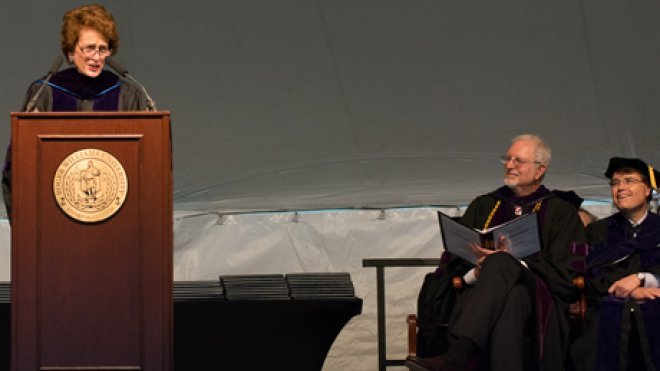For 169 New Law Graduates, 'Welcome to a Great Profession'
The Honorable Judith S. Kay – retired Chief Judge for the State of New York – reassures members of RWU Law Class of 2014 of the many opportunities to serve society, help individuals

BRISTOL, R.I. – Under moody skies, with glimpses of sunshine alternating with a mid-ceremony rain squall, the Honorable Judith S. Kaye – retired Chief Judge for the State of New York – addressed the 169 graduates of the Class of 2014 during Commencement exercises Friday.
“Welcome to a great profession,” Judge Kaye told the assembled graduates, "one that has helped assure – over the past two-plus centuries – that this remains a land of justice and equal opportunity, dedicated to the values of our founders. Do you know that more than half of the signers of the Declaration of Independence were lawyers, as were many of the delegates to the Philadelphia convention, leaders in the revolutionary movement, and drafters and signers of the Constitution? Throughout history, our most pressing social, economic and political issues have rested in the hands of lawyers and judges.”
“To this day,” she added, “the lawyer stands as the essential intermediary in our nation’s social progress in the resolution of every key issue – from global Internet privacy to neighborhood individual property. I have yet to discover any other calling this offers so many opportunities for serving society generally and helping people individually.”
Kaye is known for her groundbreaking leadership of New York’s judicial system. During her tenure, she tackled contentious issues such as the rights of gay couples and the death penalty in her rulings. In addition, she instituted specialized courts focusing on drug addiction, mental health and domestic violence that have been modeled in many other states.
The law school also awarded honorary degrees to Rhode Island Superior Court Judge Robert D. Krause and Robert Mansfield Barge, executive director of Rhode Island Legal Services, Inc.
Krause was named to the Superior Court bench in 1986 and has presided over some of the state’s most high-profile trials. Prior to that, he served as an assistant United States attorney for the District of Rhode Island and in the Southern District of California.
Barge has been the executive director of the Rhode Island Legal Services (RILS) since 1990. The nonprofit law firm provides representation to low-income Rhode Islanders in a variety of civil matters. During his 35 years with the RILS, Barge has worked as a staff attorney, managing attorney and director of its Inner City Advocacy Project, an outreach effort for the state’s minority communities.
Endings and Beginnings
Commencement 2014 also marked the last commencement under the leadership of outgoing Dean David A. Logan, who has led the law school for the past 11 years. Michael J. Yelnosky will assume the helm July 1.
“This is the climax of an entire year celebrating the 20th Anniversary of Rhode Island’s first and only law school,” Judge Kaye observed. “Here stands Roger Williams University School of Law, at the brink of 21, now into its third decade – now that’s full maturity in every sense. And imagine, more than half of this law school’s wonderful history has flourished under the baton of your remarkable dean, David Logan. Congratulations, Dean Logan. You have surely earned a return to your first love, which is full-time teaching, with our boundless gratitude.”
This year’s ceremony was also the final one for the Mark Mandell, Esq., as chair of the school’s Board of Directors. Still a popular adjunct professor at the school and a member of RWU’s Board of Trustees, he will be succeeded as chair of the law school board by the Honorable William E. Smith of the U.S. District Court for the District of Rhode Island
The valedictory address was delivered by Samantha McCoy Clarke, who spoke of her class’s boots-on-the-ground work experiences “at private firms and corporate offices; and the fact that, day in and day out, we proved that we belonged there.”
And she noted her classmates’ – and the school’s – dedication to public service, including “those late nights at the ACI [Adult Correctional Institute], the spring breaks and summers spent providing legal services to those who needed it most, the compassion shown by all the student attorneys in the clinics, the internships, externships, tax assistance, panels, outreach and more – much more. Too much to list, and often the work didn’t have a name or a class credit associated with it. We just did it. We did it to serve.”